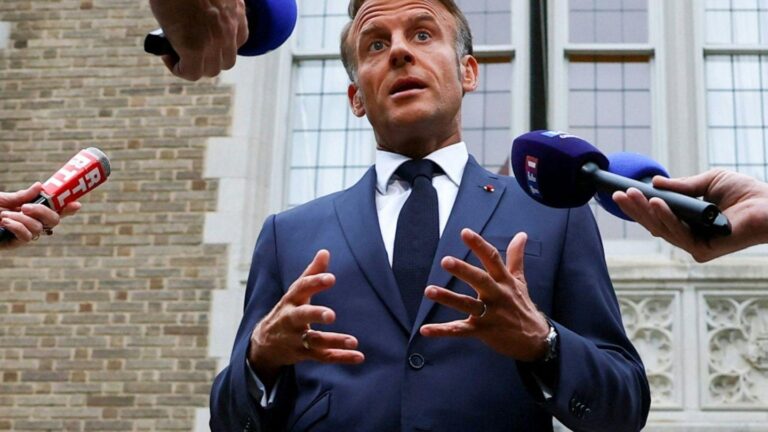French President Emmanuel Macron has publicly reprimanded the United States ambassador to France following the envoy’s recent warnings about a spike in anti-Semitic attacks across the country. Amid growing concerns over the safety of Jewish communities in France, the diplomatic clash highlights rising tensions as Macron seeks to manage domestic and international reactions to the surge in hate crimes. This development raises questions about the broader political and social challenges facing France in addressing anti-Semitism.
Macron Criticizes US Diplomat Over Statements on Rising Anti-Semitic Attacks in France
French President Emmanuel Macron publicly challenged the US Ambassador’s recent remarks concerning the alarming increase in anti-Semitic incidents throughout France. Macron accused the diplomat of exaggerating the situation and undermining France’s efforts to combat hatred and promote social cohesion. The president emphasized that while any anti-Semitic act is intolerable, portraying the country in a negative light to foreign audiences risks fostering division rather than solidarity.
Key points surrounding the controversy include:
- Divergent perspectives: Macron insists that France is making strong institutional strides, whereas the US diplomat highlighted a sharp rise in targeted attacks against the Jewish community.
- Public reaction: French Jewish groups expressed mixed feelings, some welcoming international attention while others criticized Macron’s response as dismissive.
- Government measures: Recent steps like increased policing and educational initiatives were cited to counteract prejudice.
| Year | Reported Anti-Semitic Attacks | Government Actions |
|---|---|---|
| 2021 | 687 | Task Force Established |
| 2022 | 915 | Enhanced Surveillance |
| 2023 | 1,120 | Public Awareness Campaigns |
Analysis of Growing Anti-Semitism Trends and Government Response in French Communities
Recent months have witnessed a worrying escalation in anti-Semitic incidents across various French communities, marked by a surge in verbal harassment, physical assaults, and vandalism targeting Jewish individuals and institutions. Reports indicate that these attacks are not confined to specific regions but are spreading into urban and suburban areas alike, raising alarms among both local demographics and international observers. Many community leaders and human rights organizations have criticized the French government for what they perceive as a delayed or insufficient response to the deepening crisis. The emotional toll on victims and their families is compounded by a climate of fear that threatens the social cohesion within multicultural neighborhoods.
In response, the government has deployed additional security measures, including increased police presence around synagogues and Jewish schools, and accelerated investigations aimed at bringing perpetrators to justice. However, critics argue that these efforts are reactive rather than preventative, calling instead for comprehensive policies tackling the root causes of anti-Semitism, such as hate speech proliferation online and socio-economic disenfranchisement. The table below summarizes recent statistics on reported anti-Semitic incidents alongside government actions taken within the last quarter.
| Incident Type | Reported Cases | Government Actions |
|---|---|---|
| Verbal Harassment | 128 | Asylum for Victims, Awareness Campaigns |
| Physical Assaults | 57 | Increased Police Patrols, Faster Prosecutions |
| Property Vandalism | 32 | 24/7 Surveillance, Community Watch Programs |
- Enhanced coordination between national and local security agencies
- Educational reforms promoting tolerance and religious diversity
- Crackdown on online hate speech through legislative measures
Experts Recommend Enhanced Security Measures and International Cooperation to Combat Anti-Jewish Violence
In light of the alarming rise in anti-Jewish violence across France, security experts emphasize the necessity of stronger preventative measures and a unified international response. Authorities are urged to implement proactive strategies that combine enhanced surveillance, improved community policing, and real-time intelligence sharing. Experts argue that tackling this menace requires not just national resolve but coordinated efforts among global partners to dismantle extremist networks and cut funding channels that perpetuate hate crimes.
Key recommendations include:
- Establishing dedicated task forces within law enforcement agencies to monitor hate crimes
- Fostering international intelligence collaboration focused on extremist groups
- Strengthening legislation to impose harsher penalties on perpetrators
- Launching educational campaigns to combat rising intolerance in vulnerable communities
| Measure | Expected Impact | Timeline |
|---|---|---|
| Enhanced Surveillance | Faster identification of threats | Within 6 months |
| International Cooperation | Disruption of extremist financing | Ongoing |
| Legislative Reform | Deterrence through stricter penalties | Within 1 year |
| Community Education | Reduction in societal prejudice | Within 2 years |
In Retrospect
As tensions over rising anti-Semitic incidents in France continue to mount, President Macron’s public rebuke of the U.S. ambassador underscores the delicate diplomatic balancing act at play. While the surge in attacks has prompted international concern, the French government remains sensitive to external criticism amid efforts to address hate crimes domestically. The evolving dialogue between Paris and Washington highlights the challenges in confronting anti-Semitism while navigating complex international relations.




